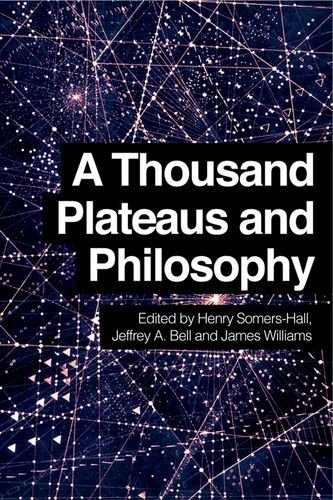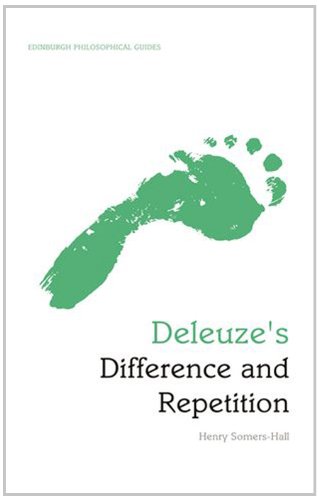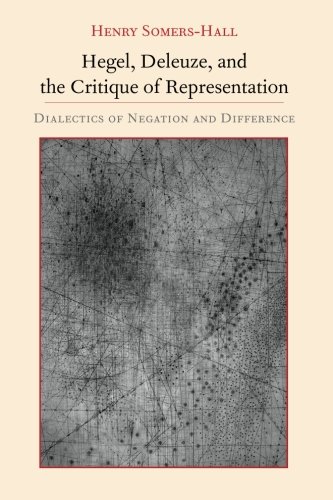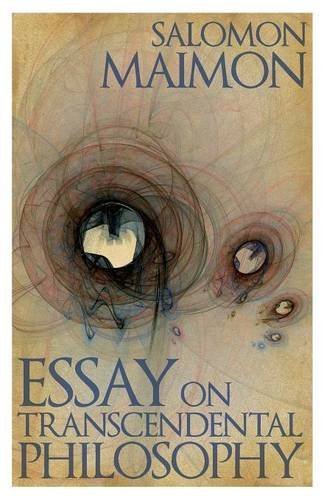Adventures of Nomad Thought: Reading Deleuze and Guattari’s A Thousand Plateaus (Edinburgh University Press, forthcoming 2026)
Deleuze and Guattari’s A Thousand Plateaus is one of the most inventive works of philosophy of the twentieth century, constructing an sustained argument for the need to develop a new model of thought across a number of intellectual domains for both philosophy and our understanding of social relations. Adventures of Nomad Thought will provide the first comprehensive reading of A Thousand Plateaus as a philosophical text, drawing on the full range of their engagements within and outside of philosophy. By interweaving these engagements into the structure of the argument itself, Adventures of Nomad Thought will show sustained and rigorous argument at the heart of the text. As well as an abundance of new research for those working within the field of philosophy, Adventures of Nomad Thought will be invaluable for those working in other disciplines who want to engage with the full force of Deleuze’s and Guattari’s distinctive approach. You can read a sample chapter on the Geology of Morals here.
The Deleuzian Mind (Routledge Press, 2025) (with Jeffrey A. Bell)

Gilles Deleuze was one of the most influential philosophers of the second half of the twentieth century. As with other French philosophers of his generation, such as Jacques Derrida and Michel Foucault, Deleuze’s work and his collaboration with Félix Guattari has also had huge influence in other disciplines, particularly literature, film studies, architecture and science and mathematics.
The Deleuzian Mind is an outstanding collection which explores the full extent and significance of Deleuze’s work, its reception and its legacy. Comprising thirty-eight chapters written by an international and interdisciplinary team of contributors. With its wide-ranging exploration of Deleuze’s thought and the huge influence it continues to have within the theoretical humanities and social sciences, The Deleuzian Mind is invaluable reading for students, researchers and scholars in philosophy, literature, film studies and political theory.
Judgement and Sense in Modern French Philosophy (Cambridge University Press, 2022)
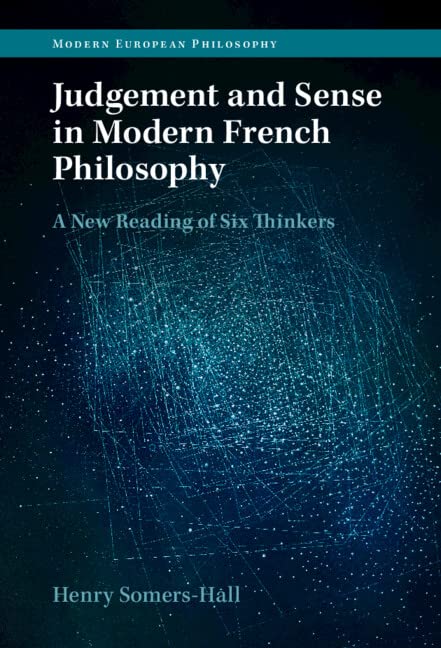
This book proposes a radical new reading of the development of twentieth-century French philosophy. Henry Somers-Hall argues that the central unifying aspect of works by philosophers including Sartre, Foucault, Merleau-Ponty, Deleuze and Derrida is their attempt to provide an account of cognition that does not reduce thinking to judgement. Somers-Hall shows that each of these philosophers is in dialogue with the others in a shared project (however differently executed) to overcome their inheritances from the Kantian and post-Kantian traditions. His analysis points up the continuing relevance of German idealism, and Kant in particular, to modern French philosophy, with novel readings of many aspects of the philosophies under consideration that show their deep debts to Kantian thought. The result is an important account of the emergence, and essential coherence, of the modern French philosophical tradition. You can find the introduction here.
A Thousand Plateaus and Philosophy (2018) (with Jeffrey A. Bell and James Williams)
While Deleuze considered his later collaborations with Guattari to surpass his earlier sole authored works, the reception of Deleuze’s thought in the Anglo-American philosophical world has been almost exclusively in terms of his early work. A Thousand Plateaus and Philosophy will bring a renewed focus on the philosophical significance of Deleuze and Guattari’s later work bring bringing together some of the leading scholars of it to collaboratively develop a close reading of their most important work: A Thousand Plateaus. Each contributor addresses a different plateau, relating Deleuze and Guattari’s own text to their own specific philosophical interests. The collection will combine the virtues of an introduction to the work with deep scholarship from those at the forefront of research on Deleuze and Guattari. You can read the introduction here.
The Cambridge Companion to Deleuze (2012) (with Daniel Smith)
Gilles Deleuze (1925–95) was an influential and provocative twentieth-century thinker who developed and presented an alternative to the image of thought found in traditional philosophy. This volume offers an extensive survey of Deleuze’s philosophy by some of his most influential interpreters. The essays give lucid accounts of the fundamental themes of his metaphysical work and its ethical and political implications. They clearly situate his thinking within the philosophical tradition, with detailed studies of his engagements with phenomenology, post-Kantianism and the sciences, and also his interventions in the arts. As well as offering new research on established areas of Deleuze scholarship, several essays address key themes that have not previously been given the attention they deserve in the English-speaking world.
Deleuze’s Difference and Repetition: An Edinburgh Philosophical Guide (2013)
When students read Difference and Repetition for the first time, they face two main hurdles: the wide range of sources that Deleuze draws upon and his dense writing style. This Edinburgh Philosophical Guide helps students to negotiate these hurdles, taking them through the text step by step. It situates Deleuze within Continental philosophy more broadly and explains why he develops his philosophy in his unique way. Seasoned Deleuzians will also be interested in Somers-Hall’s novel interpretation of ‘Difference and Repetition’. You can read the first chapter here.
Hegel, Deleuze, and the Critique of Representation (2012)
A critical account of the key connections between twentieth-century French philosopher Gilles Deleuze and nineteenth-century German idealist G. W. F. Hegel. Hegel, Deleuze, and the Critique of Representation provides a critical account of the key connections between twentieth-century French philosopher Gilles Deleuze and nineteenth-century German idealist G. W. F. Hegel. While Hegel has been recognized as one of the key targets of Deleuze’s philosophical writing, Henry Somers-Hall shows how Deleuze’s antipathy to Hegel has its roots in a problem the two thinkers both try to address: getting beyond a philosophy of judgment and the restrictions of Kant’s transcendental idealism. By tracing the development of their attempts to address this problem, Somers-Hall offers an interpretation of the sweep of nineteenth- and twentieth-century philosophy, providing a series of analyses of key moments in the history of thought, including the logics of Aristotle and Russell, Kant’s own philosophy of judgment, and the philosophy of Bergson. He also develops a novel interpretation of Deleuze’s philosophy of difference, and situates his philosophy in relation to the broader post-Kantian tradition. In addition to Deleuze’s relation to Hegel, the book makes important contributions to the study of Deleuze’s philosophy of mathematics, as well as to the study of several underappreciated areas of Hegel’s own philosophy.
Salomon Maimon’s Essay on Transcendental Philosophy (2009)
Essay on Transcendental Philosophy presents the first English translation of Salomon Maimon’s principal work, originally published in Berlin in 1790. In this book, Maimon seeks to further the revolution in philosophy wrought by Kant’s Critique of Pure Reason by establishing a new foundation for transcendental philosophy in the idea of difference. Kant judged Maimon to be his most profound critic, and the Essay went on to have a decisive influence on the course of post-Kantian German Idealism. A more recent admirer was Gilles Deleuze who drew on Maimon’s Essay in constructing his own philosophy of difference. This long-overdue translation makes Maimon’s brilliant analysis and criticism of Kant’s philosophy accessible to an English readership for the first time. The text includes a comprehensive introduction, a glossary, translators’ notes, a bibliography of writings on Maimon and an index. It also includes translations of correspondence between Maimon and Kant and a letter Maimon wrote to a Berlin journal clarifying the philosophical position of the essay, all of which bring the book’s context alive for the modern reader.
